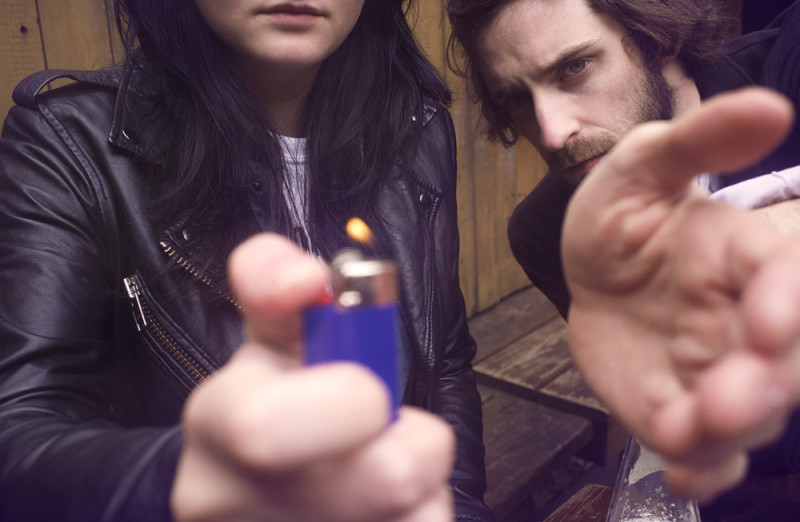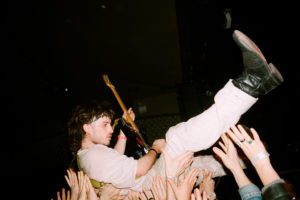Nina Ljeti and Vladimir de Fontenay might not be household names just yet, but it’s safe to assume that it shouldn’t be too much longer until they’ve made a serious mark on the film world. After collaborating on various projects in the last few years (and just hanging out at cool bars in the Lower East Side together), the filmmakers learned to combine their individual perspectives and create emotionally charged material.
They were approached by James Franco to co-direct Memoria, a feature film based on his book California Childhood, starring Franco himself, Sam Dillon (aka the boy from Arcade Fire’s/Spike Jonze’s Scenes from the Suburbs) and Keith Stanfield (aka the awesome actor whose performance in Short Term 12 probably made you cry), among other young talents. The film is currently in its post-production phase, so keep your eyes peeled for updates on its release.
Although they’re both in the midst of various projects, the duo set some time aside to have a little chat with us and answer our questions about music, teen angst, and of course, Memoria.
How did you two meet? And how did you get involved with the project?
NINA: We met when Vlad was working on a performance piece called ‘Collage’ that I acted in and co-wrote with James Franco. After that, Vlad asked me to be in his short film, Mobile Homes. Then, when James [Franco] asked me to write and direct Memoria, I really felt that I wanted to co-create it with a fellow artist, and Vlad was the obvious choice for many reasons.
VLAD: Nina and I met on ‘Collage,’ a performance piece she was doing with James three years ago. I was a camera operator for a few shows on the project. It was a really bizarre encounter, but we got along. I asked Nina to be in my short film Mobile Homes, and couple of months later, after making other small projects and mainly hanging out at Max Fish and her apartment in the LES, she asked me to work with her on the adaptation of James’ short stories.
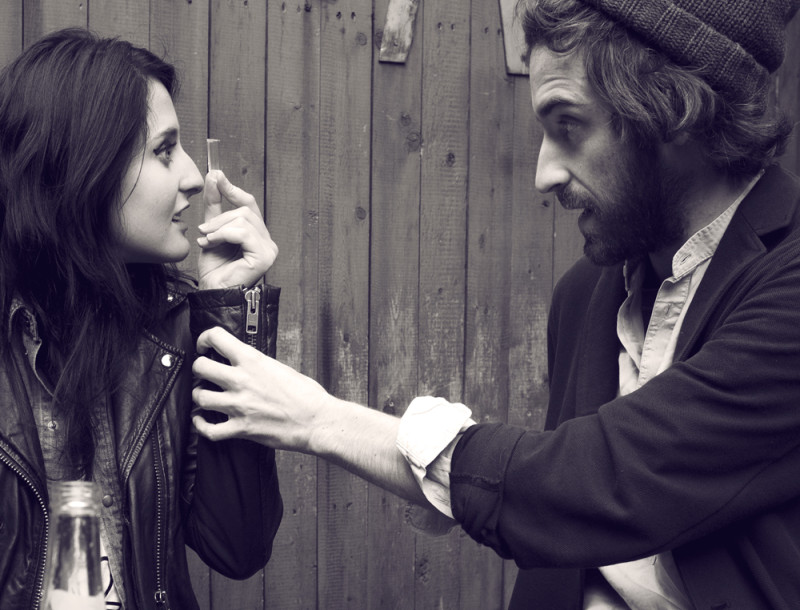
What was your experience like working as co-directors? Did you both have a similar vision on how to tell the story?
NINA: Yeah. We were both working on the film from the beginning, so our vision was very similar. Directing with Vlad was easier than I expected it to be because he’s very respectful and understanding, and as excited about the process as I am.
VLAD: Nina and I spent so much time with the material — writing, sharing our experiences growing up, our tastes in film, photography, music, books — that when pre-production started, we really had a similar film in mind, I think. Nina and I are so different, which I believe is an incredible strength when it comes to telling a story. It forces you to look at the other side of things and explore different points of view, and so we tried to take advantage of our different perspectives as much as possible in the writing and on set. Having two sets of hands and eyes on this particular project also turned out to be extremely helpful and time-saving, given the limitations we had in terms of schedule and budget.
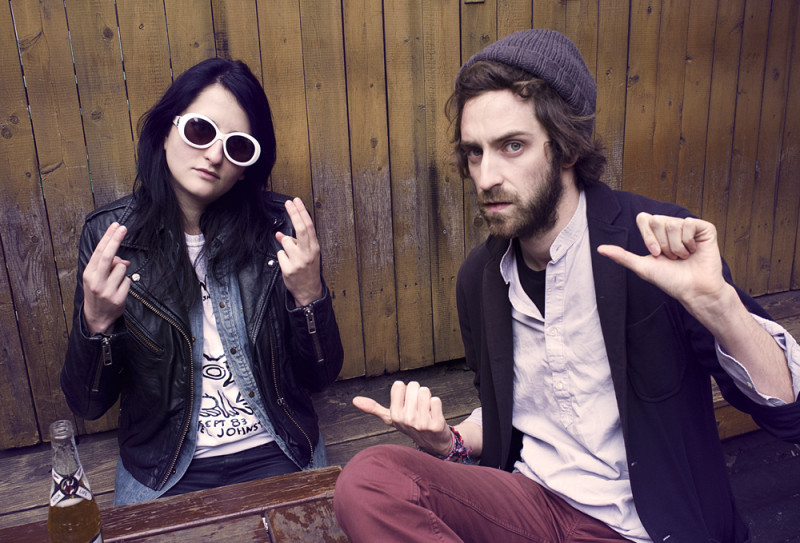
Teen angst is kind of a universal theme, but is it difficult to direct a depiction of someone else’s experiences? Did you have to channel your inner suburban-California-teenage selves?
NINA: Yeah. I had to channel my life as a punk teen growing up in Windsor, Canada (which Stephen Colbert calls the ‘asshole of the world’). There are a few characters in the story that are a reflection of the kids I knew growing up. That made it easier for me to write about them, for sure.
VLAD: I grew up in Paris, and moved to Italy when I was 18. I only came to the US several years later so there wasn’t much inner suburban-California-teenage self in me to channel! A lot of it, for me, was going back to my memories of being a teenager. I realized how unique and universal some of the feelings are, and I basically started writing from there. The rest is research and observation, really. In general, I find it stimulating to write from a place that is slightly removed from your reality — to freely project your experiences and emotions to it.
The stories upon which Memoria is based seem to be very personal to Franco. What was it about Memoria that you related to?
NINA: Memoria is a really personal story for Franco. It was interesting watching him work on set because he was emotionally affected by the work. I found that really touching.
For me, personally, it was the hopelessness and confusion and anger that I felt as a teenager. All of our characters are dealing with the feelings that come with being a young adult. They are common feelings for everyone, but for our characters, they are dealt with in (sometimes) impractical or dramatic ways.
I dealt with my angst by listening to punk rock, drinking, and hanging out at skate parks with my friends. Our characters are doing the same thing in our film, which is rad. But they are also taking it a step further.
VLAD: In some ways I could really relate to the experiences of our lead character (which can be a little frightening at times), the character James knew and wrote about. As a teenager, I remember having such a hard time being myself around my friends and family. You feel extremely lonely because it seems like no one can connect with you or understand how serious what you’re experiencing is. It’s like everyone you know has been through it but denies you the right to give it the weight it deserves.
What was your creative process in terms of research and preparation?
NINA: We spent a lot of time re-watching Larry Clark and Harmony Korine films, particularly Kids, Wassup Rockers, and Gummo, and we were very inspired by Gus Van Sant’s Elephant. We referred to that film a lot when we were planning our shot list and when we were doing re-writes on the script.
VLAD: A lot of our creative processes involved remembering what we were like at that age and how we used to feel about certain things. We also re-watched tons of films — mostly the films we love, which dealt with adolescence and fucked up teens (Elephant, Fish Tank, Water Lillies, but also Zero de conduite, Fat Girl, Dogtooth, Mysterious Skin…). We spent time looking at photographs from Ed Templeton (Teenage Kissers) and Nick Haymes’ book, Gabe, which depicts Gabe Nevins (the young actor in Paranoid Park who ended up living on the streets in LA). We also spent a lot of time casting at skate parks and strange parties during the prep in LA.
We saw that Cole Alexander from the Black Lips was one of the first people cast for the film. Can you tell us what the casting process was like?
NINA: Basically, I met him at the Cha Cha Lounge in Los Angeles one night, and he had expressed to me that he wanted to be an actor. I kind of looked him up and down once and realized that he would be perfect for the part of Dickey Ferriante (the drug dealer) in our film. I asked him on the spot if he’d like to meet with me and Vlad to discuss the role further.
Cole is so rad, I can’t say that enough. He was so stoked to be a part of our film, and so kind. I really respect him as a musician and a performer. He is just as thrilling to watch on screen as he is when he’s playing with the Black Lips. I can’t wait to work with him again.
VLAD: Nina met with him and had this great intuition that he’d be perfect for the part of Dickey. We met and I liked his personality right away, and I believed he’d be super convincing. We were really stoked to have him — he’s so natural and soulful. He brings a lot of authenticity to the film, and somehow grounds the experience of these kids to reality. Cole invited us to a Black Lips show in NY a few weeks ago, but I showed up at the wrong concert hall 🙂
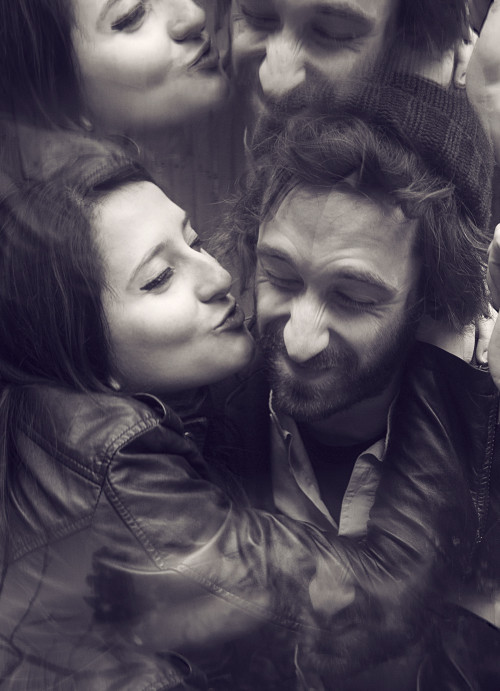
What are you guys currently listening to? Who are some of the artists that will be featured on the soundtrack?
NINA: Currently I’m listening to Together Pangea, the Black Lips, and Liphemra. Together Pangea’s new album Badillac is so dope. They actually let us use their house for a scene in our movie too, so I’m really grateful for that. Liphemra is really great, too. She’s a good friend of mine from Los Angeles, and she was also an extra in our party scene, haha.
We’re still deciding what artists we want featured on the soundtrack. We haven’t made any moves yet, but we’re definitely exploring some of our friend’s bands. Burger Records actually gave us a bunch of pins to use for our film, so it would be cool if we could use some Burger artists.
VLAD: Bo [Mitchell], one of our actors, introduced me to Future Islands, and I’ve been listening to their new album. I’ve also been listening to Keith [Stanfield] and Cole’s music, which I like a lot. I love the idea that our cast brings its musicality and taste to the film, and get influenced by it in return. But I can pretty much listen to any kind of music really — on my iPhone, you’ll find Beach House, Lil Wayne, Charles Aznavour, the Black Lips, Daniel Johnston (that Nina recently made me discover) and some French bands I’m working with. And they’re probably all on the same playlist!
What do you hope people will take away from the film?
NINA: I’d like people to see something of themselves in the film, or if not, to appreciate the experience of watching these kids grow up and deal with these adolescent issues.
VLAD: I hope they’ll be filled with conflicting emotions, reflecting on all those moments that make them both relieved and nostalgic to not be a teen anymore.
What are your directorial plans, post-Memoria?
NINA: I am currently developing my second feature — an original script that I am very excited about. It’s called Things You Missed (While You Were Gone).
VLAD: I am currently at work on a feature script inspired by my short film Mobile Homes, which I hope to be directing this winter.
Nina Ljeti
Vladimir de Fontenay
Follow Memoria for updates
Interview by Nicole Woszczyna. Find her online @nicolewosz.
Photographed by Cheryl Georgette Arent for Issue #2. Find her online @bohemianforest.
